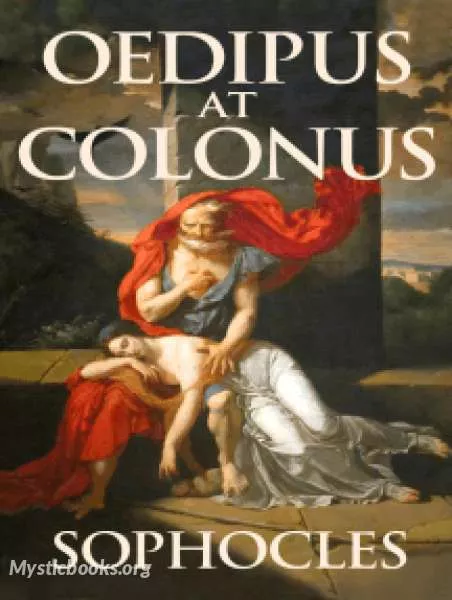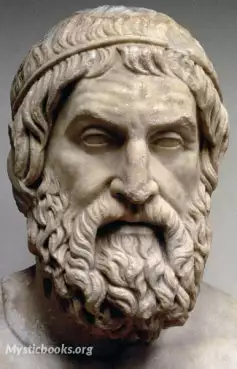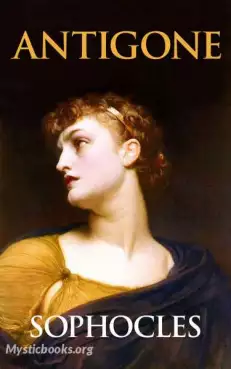
Oedipus at Colonus
by Sophocles
'Oedipus at Colonus' Summary
Led by Antigone, Oedipus enters the village of Colonus and sits down on a stone. They are approached by a villager, who demands that they leave, because that ground is sacred to the Furies, or Erinyes. Oedipus recognizes this as a sign, for when he received the prophecy that he would kill his father and marry his mother, Apollo also revealed to him that at the end of his life he would die at a place sacred to the Furies and be a blessing for the land in which he is buried.
The chorus, consisting of old men from the village, enters and persuades Oedipus to leave the holy ground. They then question him about his identity and are horrified to learn that he is the son of Laius. Although they promised not to harm Oedipus, they wish to expel him from their city, fearing that he will curse it. Oedipus answers by explaining that he is not morally responsible for his crimes, since he killed his father in self-defense. Furthermore, he asks to see their king, Theseus, saying, "I come as someone sacred, someone filled with piety and power, bearing a great gift for all your people." The chorus is amazed and decides to reserve their judgment of Oedipus until Theseus, king of Athens, arrives.
Ismene arrives on horseback, rejoicing to see her father and sister. She brings the news that Eteocles has seized the throne of Thebes from his elder brother, Polynices, while Polynices is gathering support from the Argives to attack the city. Both sons have heard from an oracle that the outcome of the conflict will depend on where their father is buried. Ismene tells her father that it is Creon's plan to come for him and bury him at the border of Thebes, without proper burial rites, so that the power which the oracle says his grave will have will not be granted to any other land. Hearing this, Oedipus curses both of his sons for not treating him well, contrasting them with his devoted daughters. He pledges allegiance with neither of his feuding sons, but with the people of Colonus, who thus far have treated him well, and further asks them for protection from Creon.
Because Oedipus trespassed on the holy ground of the Eumenides, the villagers tell him that he must perform certain rites to appease them. Ismene volunteers to go perform them for him and departs, while Antigone remains with Oedipus. Meanwhile, the chorus questions Oedipus once more, desiring to know the details of his incest and patricide. After he relates his sorrowful story to them, Theseus enters, and in contrast to the prying chorus states, "I know all about you, son of Laius."[2] He sympathizes with Oedipus and offers him unconditional aid, causing Oedipus to praise Theseus and offer him the gift of his burial site, which will ensure victory in a future conflict with Thebes. Theseus protests, saying that the two cities are friendly, and Oedipus responds with what is perhaps the most famous speech in the play. "Oh Theseus, dear friend, only the gods can never age, the gods can never die. All else in the world almighty Time obliterates, crushes all to nothing..." Theseus makes Oedipus a citizen of Athens and leaves the chorus to guard him as he departs. The chorus sings about the glory and beauty of Athens.
Creon, who is the representative of Thebes, comes to Oedipus and feigns pity for him and his children, telling him that he should return to Thebes. Oedipus is disgusted by Creon's duplicity and recounts all of the harms Creon has inflicted on him. Creon becomes angry and reveals that he has already captured Ismene; he then instructs his guards to forcibly seize Antigone. His men begin to carry them off toward Thebes, perhaps planning to use them as blackmail to get Oedipus to follow, out of a desire to return Thebans to Thebes, or simply out of anger. The chorus attempts to stop him, but Creon threatens to use force to bring Oedipus back to Thebes. The chorus then calls for Theseus, who comes from sacrificing to Poseidon to condemn Creon, telling him, "You have come to a city that practices justice, that sanctions nothing without law." Creon replies by condemning Oedipus, saying "I knew [your city] would never harbor a father-killer...worse, a creature so corrupt, exposed as the mate, the unholy husband of his own mother." Oedipus, infuriated, declares once more that he is not morally responsible for what he did. Theseus leads Creon away to retake the two girls. The Athenians overpower the Thebans and return both girls to Oedipus. Oedipus moves to kiss Theseus in gratitude, then draws back, acknowledging that he is still polluted.
Book Details
Authors

Sophocles
Greece
Sophocles, a towering figure in ancient Greek literature, was a renowned tragedian whose plays continue to captivate audiences today. Born around 497/496 BC in Athens, he lived a long and illustrious...
Books by SophoclesDownload eBooks
Listen/Download Audiobook
- Select Speed
Related books

Shakuntala by Kalidasa
Shakuntala, a Sanskrit play by Kalidasa, is a classic of Indian literature, known for its poetic language and moving story of love and fate. The play...

Rose Garden Husband by Margaret Widdemer
In Margaret Widdemer's 'Rose Garden Husband,' we encounter Phyllis, a capable children's librarian yearning for a deeper sense of connection and belon...

Sir Harry Wildair by George Farquhar
Sir Harry Wildair is a Restoration comedy by George Farquhar, a sequel to his earlier play *The Constant Couple*. Set in the bustling and fashionable...

Two Pastorals: an Heroic and a Comic by Moliere
'Two Pastorals' by Moliere is a collection of two plays: 'Melicerte', an unfinished heroic pastoral, and 'A Comic Pastoral'. 'Melicerte' tells the sto...

Dream within a Dream by Edgar Allan Poe
LibriVox volunteers bring you 15 different recordings of A Dream within a Dream by Edgar Allan Poe. This was the weekly poetry project for the week of...

Shakespeare Monologues Collection vol. 09 by William Shakespeare
This is the ninth collection of monologues from Shakespeare’s plays. Containing 20 parts.

The Admirable Crichton by J. M. Barrie
The Admirable Crichton is a comic stage play written in 1902 by J. M. Barrie.

Condenada y Otros Cuentos by Vicente Blasco Ibanez
This collection of short stories by Vicente Blasco Ibáñez offers a glimpse into the lives of ordinary people in early 20th-century Spain. The stories...

The Vortex by Noël Coward
It focuses on an ageing beauty who uses affairs with younger men to keep her feeling relevant, and her son (originally played by Coward himself) who...
Reviews for Oedipus at Colonus
No reviews posted or approved, yet...
